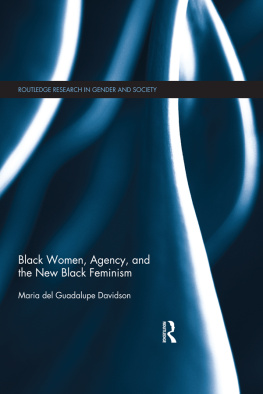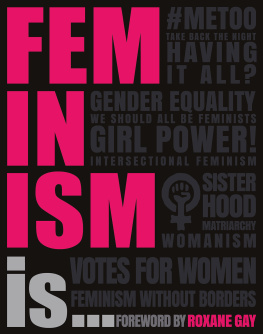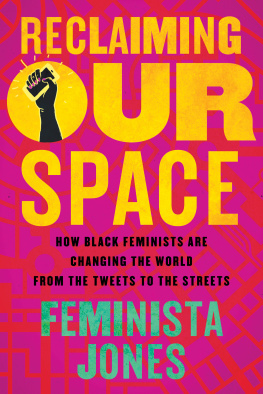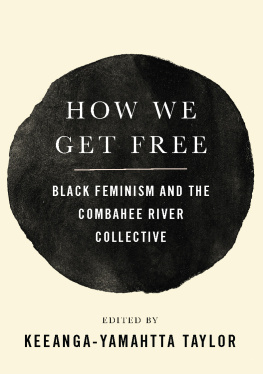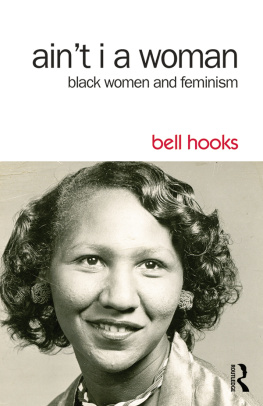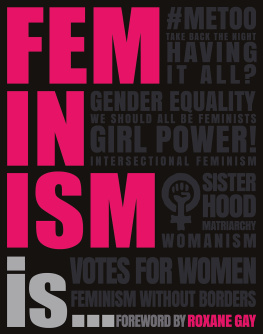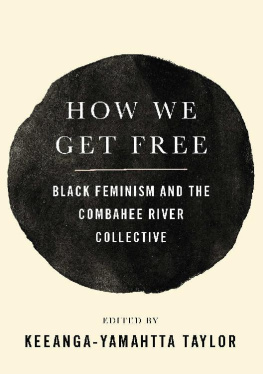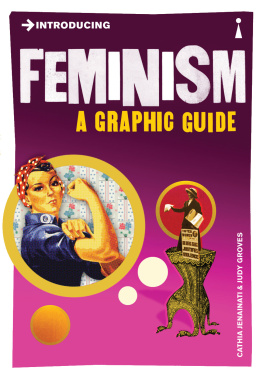Table of Contents
FOR...
Maria Stewart, Anna Julia Cooper, Nannie Burroughs, Pauli Murray,
and Audre Lordewho showed us the way
the sister-writers in Theorizing Black Feminisms
the SAGE editorial group
all the students at Spelman
my mother, Ernestinewho stays in my heart
all my sister-friends, especially Paula
and most especially for my sister Francine who helps me see rainbows
Preface
The intellectual history of a people or nation constitutes to a great degree the very heart of its life. To find this history, we search the fountainhead of its language, its customs, its religion, and its politics expressed by tongue or pen, its folklore, and its songs.
GERTRUDE BUSTILL MOSSELL, 1894
The history of American feminism has been primarily a narrative about the heroic deeds of white women. In Miriam Schneirs Feminism: The Essential Historical Writings (1972), which focuses on first-wave feminism, Sojourner Truth is the only black woman from the mid-nineteenth century to the 1920s who helped to create the conditions that made second-wave or modern feminism possible. The chapter on Men as Feminists did not include Frederick Douglass (he is included in the chapter on An American Womans Movement) and William E. B. Du Bois, two of the most outspoken womens rights advocates in the nineteenth century. In Schneirs subsequent volume, Feminism in Our Time: The Essential Writings, World War II to the Present (1994), black women are more visible, but the old framework remains unchallenged. In her brief description of the circumstances that precipitated the first organized womens movement in 1848 at Seneca Falls, New York, black women are absent, slavery is not mentioned, and generalizations about American womanhood clearly refer only to a particular class of white women. Elizabeth Cady Stanton and Susan B. Anthony are invoked, predictably, as the quintessential feminists.
Words of Fire: An Anthology of African American Feminist Thought documents the presence of a continuous feminist intellectual tradition in the nonfictional prose of African American women going back to the early nineteenth century when abolition and suffrage were urgent political issues. It is a rewriting of the familiar narrative of American feminism and a retelling of African American intellectual history. It is deliberately incomplete and includes mostly previously published essays.
Because black women scholars (primarily) have documented over the past two decades the existence of a black womens literary tradition For several reasons I have omitted from this collection fiction, poetry, and literary criticism, though black feminist perspectives certainly inform much of this work, particularly since the 1960s. The literature of contemporary black women is more accessible because of a tremendous outpouring of publications heralding what some scholars call a black womens literary renaissance. As literary critic Cheryl Wall indicates, over the past two decades, Afro-American women have written themselves into the national consciousness. Their work is widely read, frequently taught, and increasingly the object of critical inquiry (Wall, I). Literary critic Deborah McDowells edited Black Women Writers series (Beacon Press), the thirty-volume series, The Schomburg Library of Nineteenth-Century Black Women Writers (1988), edited by Henry Louis Gates, Jr., as well as other reclamation projects, also make available a broad range of writing by black women in the nineteenth and early twentieth centuries.
I have also not included pioneering critical essays in black feminist literary studies such as Mary Helen Washingtons Black Women Image Makers: Their Fiction Becomes Our Reality, June Jordans On Richard Wright and Zora Neale Hurston: Notes Towards a Balancing of Love and Hate,
I use the term feminist to capture the emancipatory vision and acts of resistance among a diverse group of African American women who attempt in their writings to articulate their understanding of the complex nature of black womanhood, the interlocking nature of the oppressions black women suffer, and the necessity of sustained struggle in their quest for self-definition, the liberation of black people, and gender equality. Some also express solidarity with other women and people of color engaged in local and global struggles for liberation. Cheryl Wall names these impulses critical self-consciousness about our positionality, defined as it is by race, gender, class, and ideology. bell hooks describes this kind of theorizing on the part of black women, including herself, coming from our lived experience of critical thinking, reflection, and analysis. Selections were chosen not because the authors self-identify as feminists or are being defined by me as feminists; some may even reject this terminology altogether. I concur with bell hooks who reminds us that we can act [or write] in feminist resistance without ever using the word feminism. They have different family configurations and class backgrounds, widely divergent political views, and diverse disciplinary perspectives. Sometimes their feminist discourse is autobiographical, controversial, visionary, understated and subtle, but more often it is hardhitting and strident. Some authors are passionate and angry, others more cautious and indirect. There are familiar figuresSojourner Truth, Shirley Chisholm, Angela Davisand not so familiar onesJulia Foote, Amy Jacques Garvey, and Mary Ann Weathers. They have multiple identities, several voices, and different battles to engage. They are academics, activists, artists, community organizers, mothers. They are race women, socialists, communists, Christians, atheists, lesbian and straight, traditional and radical. They share a collective history of oppression and a commitment to improving the lives of black women, especially, and the world in which we live.
The anthology has both a chronological and thematic organization with headnotes preceding each selection which include commentary about the author and the significance of the text. A broad range of issues is discussed the moral integrity of black women, lynching, poverty, institutionalized racism and sexism, the racism of white women, the sexism of black men, education, black families, male/female relationships, economics, reproductive freedom, sexual and family violence, sexuality, heterosexism, the Civil Rights movement, black nationalism, womens liberation struggles nationally and internationally, and female genital mutilation.
The first four chapters trace the development of black feminist thought from Maria Stewart, writing in the 1830s, through the emergence of black feminist theorizing in the 1970s and 1980s, and the final three chapters focus on a particular theme. Chapter I, Beginnings: In Defense of Our Race and Sex, 1831-1900, includes the writings of a number of nineteenth-century race women who are also early feminists, though they would not have used this terminology. These foremothers include a number of women whose voices are not here-Josephine St. Pierre Ruffin, Fannie Barrier Williams, Mary Shadd Cary, and Sarah Remond, to name a few. They all reveal a sensitivity to race and gender issues, though they tend not to question their culturally prescribed roles as wives and mothers. They demand equal access to education, the removal of barriers which would prohibit their work in the public domain, and a greater voice in the political arena. They also acknowledge the extraordinary accomplishments of black women in a variety of professions, despite restrictive cultural attitudes within and without the black community.


